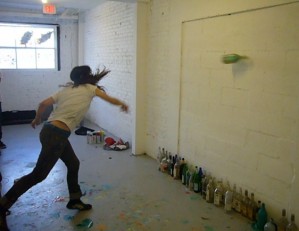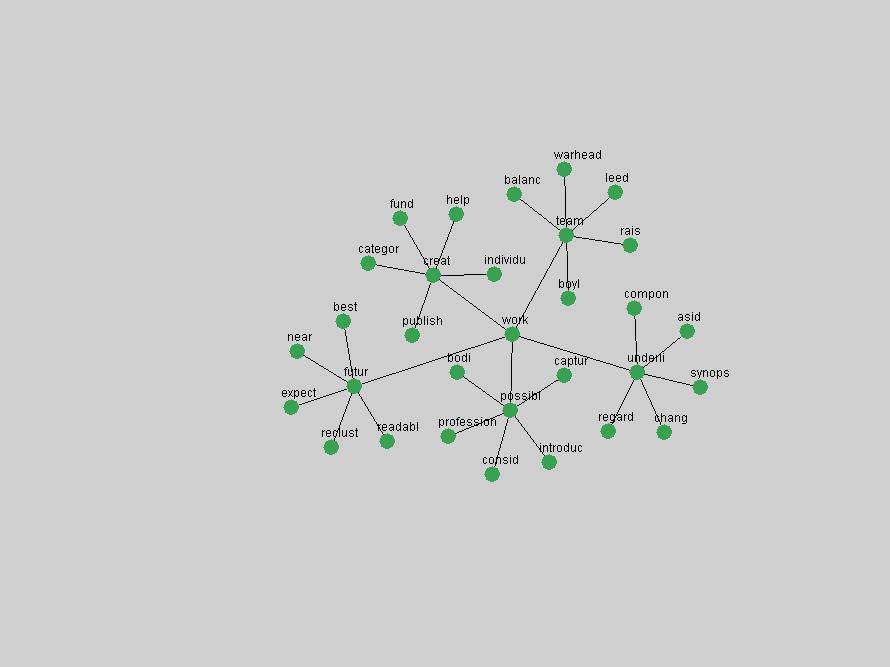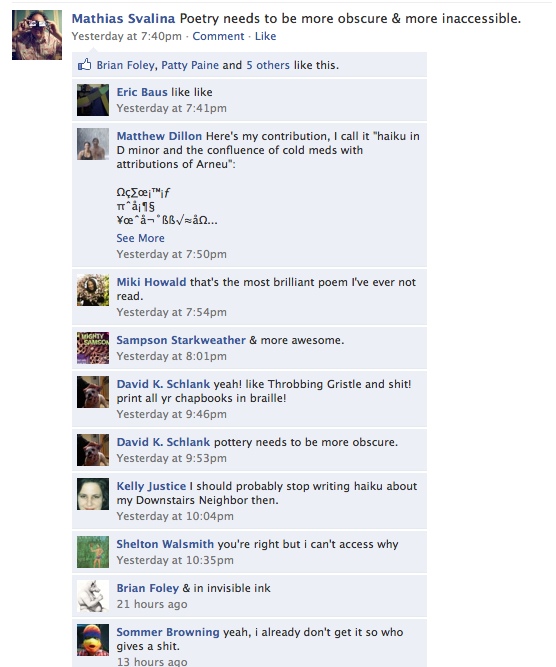Writing Down Your Goals [6.5 years later]
In light of Justin’s excellent post below, I started thinking about how I used to think about things. Early on I wrote a lot, and constantly. I had a lot of things I hoped to do. I remembered at one point a friend had told me that one common element to many successful people was that they had early on written down their goals on paper. The concrete object of those goals existing in words then was supposed help them become true. I think I remember scoffing at that some, but then one day in 2003, before I’d really published anything I can remember, I followed his advice. Today while digging through my hard drive, I found the file there in an old folder. This was just after I’d finished the first novel I eventually abandoned, before the next 3 novels I abandoned, before I got to anything I would keep today: each one, as I realized I had to give it up, from which I learned something that helped me write the next one, and write it better, I believe. In the meantime, while those to-be-destroyed words were growing older on my hard drive, I continued to work more.
Which is maybe at least part of the point Justin was getting at: that, in all the makings, it should be about the making first, and that the spread thereafter is something else entirely, and by no means necessarily a goal in and of itself, but one that should be attended to with care. I don’t think I knew then it would be I think 3 years before I started to gather toward actualizing the first item on the list. Maybe if I knew that then I would have done something else. Maybe not. Still, since 2003, a lot has changed, environments, forums, access, but on the other hand, a lot has not. Whatever these mean for ‘where I am now,’ and as goofy or green as they may seem almost seven years later, you can take for what it is: a continuation of an idea, one still in the manner of its cycle, every day:
My Goals as of May 5, 2003
– Get short stories printed in small to medium sized magazines, starting probably with online ones, and then hopefully spreading out to print.
– Get either an agent or a publisher to accept my novel. In the meantime, continue editing the second one. In this case, a publisher would be better than an agent, but in the end, both are acceptable.
– Continue working on new short stories and random text ejaculations. Keep working on the next thing.
– DO NOT GIVE UP HOPE. Refuse to allow my aspirations to be subverted by narrow margins. Create.
– Continue to make small relationships with other writers, no matter how unaccomplished they might seem to be. At the same time, no unwarranted ass-kissing.
– After one of the first two novels has been finished, hopefully substantiate readers by spurring interest online. This part of the plan is still hazy, as I’m not sure how that operates yet, but it will come.
– Writing is writing.
Elegies, Pond Water
 First up, via the the always wonderful Steve Silberman–good words from Cory Doctorow:
First up, via the the always wonderful Steve Silberman–good words from Cory Doctorow:
Anyone who claims that readers can’t and won’t and shouldn’t own their books are bent on the destruction of the book, the destruction of publishing, and the destruction of authorship itself. We must stop them from being allowed to do it. The library of tomorrow should be better than the library of today. The ability to loan our books to more than one person at once is a feature, not a bug. We all know this. It’s time we stop pretending that the pirates of copyright are right. These people were readers before they were publishers before they were writers before they worked in the legal department before they were agents before they were salespeople and marketers. We are the people of the book, and we need to start acting like it.
I’ve been enjoying Eugene Lim’s blog lately. Some highlights: Debussy on mystery, art–the films of Desplechin–photgraphy and book reviews and sonnets.
And Joel Johnson talks about living in New York. Entertaining and mournful as hell.
You do send your Very Best work Every time when submitting to a literary magazine, right?
other countries **Updated**
what the hell is this?
I like it.
**Update**
Oops, I drunk posted. Watching the video again this morning, I just realized that if it was in English it would be the sort of “Adult Swim” crap that I really hate. Since I don’t understand it, though, I am more inclined to like it.
Which is a thought that I think can be extended to writing this way: sometimes I get the feeling that bad poets are taking a marginal idea and, unable to make it better with vivid language (or a better idea), they make do with making it unintelligible.
Unlike that video, though, I don’t like poetry to be unintelligible. Why not? I guess the difference is that it’s a lot of work to read a poem, and I don’t trust poets. (That said, sometimes I want a poem to be oblique and abstruse, ridiculous, meaningless, unintelligible, even.) (Ha.) **End Update**
well i’m not going to pay $4.50 for shipping on a book from the publisher’s website
106.2 Books in 2009
I read 106 books this year. Actually, I read more because even in going through the list I am seeing things I remember reading, like John Dermot Woods’s collection, and Amina Cain’s, and Tim Horvath’s novella, and Justin Sirois’s and at least a handful of others, not to mention the various books I read in manuscript form for blurbing or review or feedback or whatever, and all the other writing in magazines and where else. Nor does it include chapbooks, which skips a lot, because there were a lot of good chapbooks this year. In the formal count pulled off the list of books I hold on my hard drive I read 106 books, and probably will 2 or 3 more between now and the year’s out. That doesn’t count, either, the books I started and gave up on: as such, the majority of the books on this list I enjoyed.
Anyway, this is what I wrote down that I read. Writing it down as you go, which I’ve been doing since 2001 now, helps me a lot to remember what and where and when about it. It also seems to help me move along. I limited myself to saying a single sentence about each, which was hard to keep to, and then hard to finish, because that’s a lot. Not as much, probably, as the number of books I bought this year or in years before still waiting for me on the piles around my loft, which together will one day become the bricks of my future home. So anyway, for the hell of it…
One Reader Writes
This comment appeared yesterday on a very NSFW post of mine from back in June, “Getting to Know Furry Girl & Feminisnt”. It comes from Janet Hardy, co-author of The Ethical Slut, and it clears up some confusion I had about a seeming change in authorship–namely hers–between the original and revised editions of the book.
December 20th, 2009 / 10:58 pm edit Janet Hardy—
Janet Hardy here — a Google alert pointed me toward your blog when you started talking about Ethical Slut. “Catherine A. Liszt” and I are the same person — she’s a pen name I used to use when my kids were still minors (“cat-a-lyst,” get it?).
The new edition of “Slut” is an extensive rewrite and expansion of the original book — after 12 years, we found we had a lot more we wanted to say, and a lot of changes we wanted to make in how we said it. I’m glad you enjoyed the original book but I think you’ll like the new one even more.
Thanks,
Janet W. Hardy
You can learn more about The Ethical Slut (the perfect last-minute Christmas gift for that special slut in your life–or, better yet, that special non-slut you’re looking to loosen up) at the Greenery Press site (while you’re over there, be sure to also check out The Compleat Spanker and A Hand in the Bush: The Fine Art of Vaginal Fisting for all Genders and Orientations). And the best part of this whole episode is that I was reminded of how long it’s been since I checked in with either Furry Girl or with Susie Bright. Anyway, we can all look forward to more sex-positive literature-related pornography appearing on this site in the nearish future.
PS- bonus points for any commenter who, without googling, can cite the literary reference in the title of this post.
Notes To An Art Maker & Marketeer, part I
Community is important, but so is dissemination.
Magic will always reside in the product. As the ignorant become less so, look for new ways to hide process.
‘Industry standard’ means broken.
Remember that you will probably embrace the idea that offends you the most. Make it sooner rather than later.
Do people really want to communicate with their storytellers? Recognize the value in the mystic, the shaman. Resist the quick and affirmative feedback of mass social connection. Again: see the majority and violently question, reinterpret.
Anticipate ecology moving away from the market and becoming an ethics again.
Even further? Plan for an automated technocracy. How does the story change? What ails?
Gee, This is Awkward
 Your piece in Lit Mag X was all Oil Glow/Lick-Stick Skillz. I fell in love. So I asked you to submit to a Mag I edit, Lit Y. You did, kind soul. But that piece is only good, not Oil Glow/Lick-Stick Skillz. Now what do I do? Why?
Your piece in Lit Mag X was all Oil Glow/Lick-Stick Skillz. I fell in love. So I asked you to submit to a Mag I edit, Lit Y. You did, kind soul. But that piece is only good, not Oil Glow/Lick-Stick Skillz. Now what do I do? Why?



